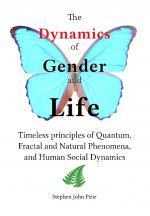[Stephen Pirie, 11 December, 2008]
Why men tend more to compete and women tend more to cooperate
According to research conducted by Dr. Joanne Winter at Melbourne’s Monash University
when women get together in a group they speak ... in a collaborative, non-competitive language, with phrases like “let’s do this” and “How about we try this.” Men in groups talk together in terms of rigid pecking order and hierarchy 1
Australia’s leading women business executives have reported that
Women... are far less hierarchical than their male peers. Instead they prefer a much flatter organizational structure with a greater emphasis on teamwork and cooperation.2
“Women have less of an ego,” she says. “They’re happy to be part of a team. Men are more individualistic, less collectivist. They like to do it themselves. And if they do work in a team, they don’t want to credit anyone else. They like to claim all the glory for themselves.3
Competition and hierarchy is born of an emphasis upon separation from others, upon an emphasis (or bias) towards independent individuality.
The masculine-particle nature is orientated towards objectivity. It is action orientated. For this reason, men (or masculine women) find a natural affinity with the outdoors and in general with all manner of physical activities. It is easily observed that men are more sports inclined (e.g. watching sporting matches on television) than women. Sports embody many of the stereotypical masculine qualities, perhaps the most important being that it is competitive and results orientated. Men want to have the biggest, the most, the fastest, the most expensive and they want to be the best—all facets which go to help distinguish the man as being different, unique and higher up the hierarchy.
|
'Feminine' |
'Masculine' |
|
Cooperative |
Competitive |
|
Relationships |
Results |
|
Empathy |
Sports, Winners |
|
Nurturer |
Warrior |
|
Pacifist |
Aggressor, Fighter |
|
Peace |
War |
The masculine-particle nature is all about claiming the space for itself. Its about asserting itself into reality, owning the space, so to speak. It is the penetrative, assertive, competitive quality characteristic of males in both the animal and human domains. The “Man as Warrior” concept developed directly from these fundamental universal principles. We may observe that as women are becoming more “masculine” by being more assertive, independent and competitive, they are being inducted as warriors (soldiers) into various armed forces throughout the world.
“Woman as Warrior” concept is being increasingly seen in our culture, reflected in the popular folk law by the increasing number and popularity of television shows and films which portray women as warriors — the princess warrior and the female vampire slayer being two such examples.
Traditionally, men have found value or have developed a sense of self by what they have done, their actions, by the results they have achieved in physical reality. By what they build, fix, or design.
That is:
As Niccolo Machiavelli observed many centuries ago
In other words, according to Machiavelli, males consider material possessions more important than close personal relationships.
On the other hand, women have traditionally found value fulfillment through being available to nurture other people (children, family, friends and community). It is often said that a mother’s role is to be there for their children. This is the dilemma now facing women who wish to do (work) instead of be (at home for their children). Women, in choosing to be more work-orientated (masculine, objective, competitive) are finding it difficult to retain their feminine (supportive, nurturing) qualities for their children.
"Doing” is a masculine, work function. “Being” is not about “doing”—“being” is the feminine quality of being immersed in possibility, in being connected, at-once with all.
The masculine (objective, particle) nature is all about exploring the clear, objective, logical, defined boundaries between me and you, us and them, here and there, this and that.
Males generally perform better than females in tests of spatial acuity and their manual dexterity. Males in both the human species and the animal kingdom in general are far more likely to be territorial with clearly defined boundaries to their domain or “turf.” In many species of animals, the male has well-documented methods to clearly and unambiguously define its territory (e.g by urinating on boundary markers, such as trees or walls). Males (and men) are more likely to be possessive of their territory, possessions (cars, motorbikes) and female mates, ready to fight off other males who would intrude into it, seek to occupy it or mate with his females.
On the other hand, women and females animals, lean towards being part of a community (herd).
See also
- The quantum physics of sex
- The immense importance of understanding 'masculine' and 'feminine'
- The Complementarity of Consciousness
- 1. Sue Williams, What We Mean To Say” The Sun-Herald, John Fairfax Holdings Ltd, Sydney, February 4, 1996, page 99.
- 2. Karen Maley, Can women run better than men? The Australian Financial Review, John Fairfax Holdings Ltd, Sydney, October 10-11, 1998, section: “Perspective” page 32.
- 3. Karen Maley, Can women run better than men? The Australian Financial Review, John Fairfax Holdings Ltd, Sydney, October 10-11, 1998, section: “Perspective” page 32.
 "The Dynamics of Gender and Life" ebook is now available at
"The Dynamics of Gender and Life" ebook is now available at